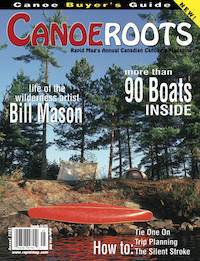Noel’s requests were quite demanding for his son’s first canoe trip. He wanted a quick and easy route only a couple of hours drive from his home near Toronto; maybe a short portage so five-year-old Walker could experience, for a brief moment, what it felt to shoulder all your belongings on your back; and a choice campsite set on a remote lake that happens to be populated by monster-sized bass. Noel has been on a number of trips with me before and I knew he wouldn’t be at all surprised to hear that such a perfect trip didn’t exist. But it did. A place called Crab Lake. And it’s a gem I couldn’t wait to share with him and Walker.
Crab Lake is reached by Wolf Lake a left turn off Highway 28, north of Peterborough but just south of Apsley, Ontario. Wolf Lake is a perfect destination on its own. Only a few cottages crowd the lake, mostly along the south shore, and a strip of Crown land along the north shore, as well as a number of small islands to the west, provide some excellent campsite possibilities.
Crab Lake is much more isolated and is easily reached by way of a short 107 meter portage located at the far end of Wolf Lake’s southwest bay. Getting to Crab Lake seemed like a relatively easy process, but with the last road not being marked we found ourselves lost. Our group missed the turn for Wolf Lake twice and even somehow managed to begin paddling across a totally different lake for half-an-hour before we resorted to asking a local cottager to steer us in the right direction.
BEGINNER’S LUCK
Crab Lake has five main bays that head off in all directions and is much larger than it first appears. Each inlet also has one or two prime campsites, complete with an exposed chunk of granite to catch a breeze and escape the bugs and a snug canopy of pine, maple and birch to pitch a tent under. Our group chose an out-of-the way spot directly below where a rough trail heads up to the top of Blueberry Mountain—an exposed hill that’s literally covered in thick blueberry bushes. On any other trip the blueberries could have been the highlight but this trip was all about the fishing. After quickly setting up camp, we headed out in the canoe again in search of the lake’s monster bass.
We cast our lines out the moment we entered the first weedy bay; Noel and I with our fancy plugs and spinners, and Walker with his half-dead worm stuck on a bear hook. It was my idea to give Walker the defunct bait, thinking the lake’s healthy population of sunfish would keep him occupied for at least long enough for Noel and me to catch some decent-sized bass for supper. Of course in no time at all Walker had caught three bass, averaging around four pounds each. Noel and I hadn’t received a single bite. Quickly we switched to the decomposing worms and, in exchange, allowed Walker full rein on our lure boxes. Ten minutes later Walker had caught two more trophy bass—one on my scent-impregnated rubber frog and the other on Noel’s pink-coloured Holla-Popper. Noel and I remained fishless.
I doubt Crab Lake has ever given up so many fish. In fact, Noel and I were quite mystified by Walker’s success and had to blame it on beginners’ luck to settle our egos. Walker, on the other hand, had a different reason for catching so many lunkers. Each time he lowered his line into the water the intrepid angler would whisper the secret code, “Here fishy, fishy, fishy.” Walker insisted that without saying this magical phrase, no fish would ever bite a hook. So, whether we agreed to play along for the fun of it, or that we just became completely desperate to catch fish, both Noel and I tossed out our lines and repeated the expression,“Here fishy, fishy, fishy.”
Thinking back, the trip to Crab Lake wasn’t a complete success according to Noel’s set criteria. The route was actually a two-and-a- half hour drive from his home near Toronto;Walker only carried his personal pack halfway along the portage before handing it over to his father; and Noel and I never did catch a trophy bass. Crab Lake did manage to fulfill his main objective though—Walker can’t wait until next years trip. And according to Noel, a father can’t ask for anything more perfect than that.
Kevin Callan is the author of numerous guidebooks for canoeists, including the bestseller Cottage Country Canoe Routes. The Crab Lake route, along with a number of other great weekend getaways in the Kawarthas, is included in his latest book Gone Canoeing: Weekend Wilderness Adventures in Southern Ontario. Callan’s newest book project Ontario’s Lost Canoe Routes is scheduled to be released this Spring.




